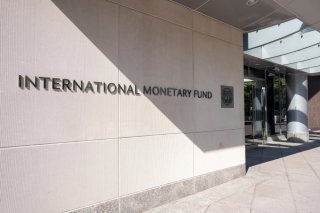The IMF’s Surveillance Failure
The best course of action for the Fed and other central banks is to pause and assess the full impact of their previous aggressive tightening.
One of the key tasks of the International Monetary Fund (IMF) is to monitor member countries’ economic and financial policies and provide them with sound economic policy advice. This activity is known as surveillance.
It would be a gross understatement to say that the IMF failed miserably in this task last year, particularly in the United States, the IMF’s largest member country. Despite all the warning signs, it managed not to sound the alarm about the inflationary dangers that lay ahead due to irresponsibly loose fiscal and monetary policies. Unchastised by this experience, the IMF now looks like it is failing in the opposite direction. It is doing so by cheerleading central banks on the need for high-interest rates for longer. Never mind that the world economy is slowing, long-term bond yields are spiking, and cracks are appearing in the global financial system.
In March 2021, the Biden administration secured passage of its $1.9 trillion American Rescue Plan to support the economy. Added to the previous year’s COVID budget stimulus packages, the Biden stimulus implied that the economy would receive cumulative budget support equivalent to a staggering 20 percent of GDP. Yet unlike former Treasury Secretary Larry Summers, who characterized this budget policy as the least responsible fiscal policy in the past forty years, the IMF was disappointingly silent in voicing criticism.
It is equally regrettable that in 2021, the IMF did not take issue with the Federal Reserve’s excessively easy monetary policy that contributed to inflation’s surge to a multi-decade high. This is all the more inexcusable, considering that the Federal Reserve allowed the broad money supply to increase by 40 percent in 2020 and 2021. At the same time, it was fueling asset price and credit market bubbles at home and abroad through aggressive bond-buying activities.
Fast forward to today, where we find that the IMF is cheerleading the Federal Reserve in its call for high interest rates for longer to reduce inflation. This is the case even though the Fed has raised interest rates by 525 basis points in the short space of eighteen months, and the broad money supply is now contracting at an unprecedented pace. It is also the case that even though the ten-year Treasury bond yields have spiked to 4.75 percent—their highest levels in the past sixteen years—signs of credit restraint abound.
Making the IMF’s acquiescence to the Fed’s currently hawkish monetary policy stance all the more difficult to understand is the fact that the IMF’s own Global Financial Stability Report (GSFR) highlights the point that financial stability risks remain elevated and risks to global growth are skewed to the downside. Among the worrying factors that it notes are the erosion in the capacity of borrowers to repay debt as rate hikes have continued, the challenges faced by the commercial real estate sector as a result of low occupancy rates with defaults on the rise, the worsening of non-bank financial institution vulnerabilities as a result of high-interest rates, and the fact that an increasing share of small and mid-sized firms in both advanced and emerging market economies have barely enough cash to pay their interest expenses.
It seems to have escaped the IMF’s notice that the recent sharp spike in Treasury bond yields could heighten the chances of a financial crisis next year. It could do so by further undermining the banks’ balance sheet position by causing further losses on their bond portfolios. This would seem to be the last thing the banks need when they are likely to be hit by a wave of defaults, especially on their commercial real estate lending.
The IMF also has forgotten that monetary policy operates with long lags. Based on past experience, it is only now that we should expect the full impact of the Fed’s earlier tightening to occur. This would suggest that the prudent course for the Fed and other central banks would be to pause and wait to see the full effect of their earlier aggressive monetary policy tightening. Yet the IMF is urging continued monetary policy hawkishness.
If the IMF again fails in its surveillance function of U.S. economic policies, it will do serious damage to its credibility. After all, the United States is the world's largest economy, and an unnecessarily deep economic recession to regain inflation control will send seismic reverberations throughout the world economy.
Desmond Lachman is a senior fellow at the American Enterprise Institute and was previously a deputy director in the International Monetary Fund’s Policy Development and Review Department and the chief emerging-market economic strategist at Salomon Smith Barney.
Image: Shutterstock.

